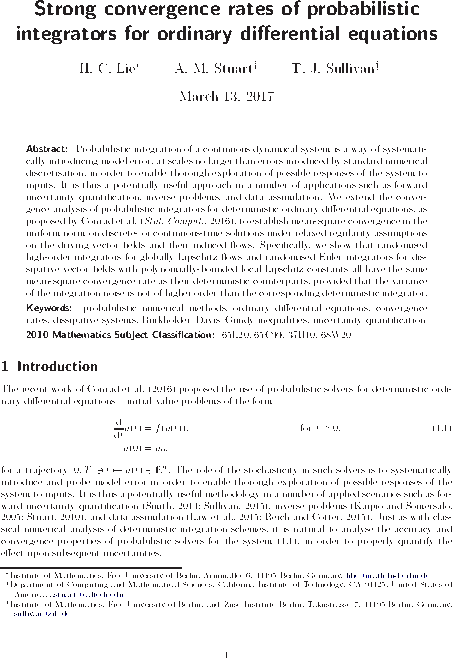
Strong convergence rates of probabilistic integrators for ODEs
Han Cheng Lie, Andrew Stuart, and I have just uploaded a preprint of our latest paper, “Strong convergence rates of probabilistic integrators for ordinary differential equations” to the arXiv. This paper is a successor to the convergence results presented by Conrad et al. (2016). We consider a generic probabilistic solver for an ODE, using a fixed time step of length \(\tau > 0\), where the mean of the solver has global error of order \(\tau^{q}\) and the variance of the truncation error model has order \(\tau^{1 + 2 p}\). Whereas Conrad et al. showed, for a Lipschitz driving vector field, that the mean-square error between the numerical solution \(U_{k}\) and the true solution \(u_{k}\) is bounded uniformly in time as
\( \displaystyle \max_{0 \leq k \leq T / \tau} \mathbb{E} [ \| U_{k} - u_{k} \|^{2} ] \leq C \tau^{2 \min \{ p, q \}} \)
(i.e. has the same order of convergence as the underlying deterministic method), we are able to relax the regularity assumptions on the vector field / flow an obtain a stronger mode of convergence (mean-square in the uniform norm) with the same convergence rate:
\( \displaystyle \mathbb{E} \left[ \max_{0 \leq k \leq T / \tau} \| U_{k} - u_{k} \|^{2} \right] \leq C \tau^{2 \min \{ p, q \}} \)
Abstract. Probabilistic integration of a continuous dynamical system is a way of systematically introducing model error, at scales no larger than errors inroduced by standard numerical discretisation, in order to enable thorough exploration of possible responses of the system to inputs. It is thus a potentially useful approach in a number of applications such as forward uncertainty quantification, inverse problems, and data assimilation. We extend the convergence analysis of probabilistic integrators for deterministic ordinary differential equations, as proposed by Conrad et al. (Stat. Comput., 2016), to establish mean-square convergence in the uniform norm on discrete- or continuous-time solutions under relaxed regularity assumptions on the driving vector fields and their induced flows. Specifically, we show that randomised high-order integrators for globally Lipschitz flows and randomised Euler integrators for dissipative vector fields with polynomially-bounded local Lipschitz constants all have the same mean-square convergence rate as their deterministic counterparts, provided that the variance of the integration noise is not of higher order than the corresponding deterministic integrator.
Published on Monday 13 March 2017 at 13:00 UTC #preprint #prob-num #lie #stuart